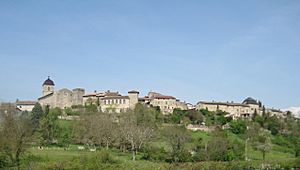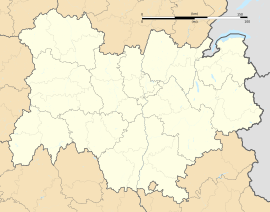Pérouges facts for kids
Quick facts for kids
Pérouges
|
||
|---|---|---|
|
A general view of Pérouges
|
||
|
||
| Country | France | |
| Region | Auvergne-Rhône-Alpes | |
| Department | Ain | |
| Arrondissement | Belley | |
| Canton | Meximieux | |
| Area
1
|
18.97 km2 (7.32 sq mi) | |
| Population
(Jan. 2021)
|
Lua error in Module:Wd at line 1,575: attempt to index field 'wikibase' (a nil value). | |
| Time zone | UTC+01:00 (CET) | |
| • Summer (DST) | UTC+02:00 (CEST) | |
| INSEE/Postal code |
01290 /01800
|
|
| Elevation | 205–303 m (673–994 ft) (avg. 270 m or 890 ft) |
|
| 1 French Land Register data, which excludes lakes, ponds, glaciers > 1 km2 (0.386 sq mi or 247 acres) and river estuaries. | ||
Pérouges is a small town in eastern France, located in a region called Ain. It's a really old town, like from the Middle Ages, and it has strong walls around it. It's about 30 kilometers (19 miles) northeast of a big city called Lyon. Pérouges sits on top of a small hill, looking over the flat land near the Ain River.
Contents
History of Pérouges
Long ago, Pérouges was home to many skilled workers. These included farmers and people who wove linen cloth. Some people think the town was started by a group of Gauls. They might have returned from a city called Perugia in Italy.
Early Days and Freedom
Archaeological finds show that people lived in Pérouges a very long time ago. This was during the Chalcolithic age, around 2500 to 1800 BC. The first time the fortress was mentioned in writing was in the 12th century. So, it's believed the fortress was built around that time.
In 1167, a local lord named Seigneur d'Anthon bravely closed the town's walls. This was to keep out soldiers from the Archbishop of Lyon. By 1236, the people of Pérouges had gained special freedom. This meant they could govern themselves.
Becoming French and Trade
Even though French soldiers attacked the town many times, Pérouges still did well. This was because of its good location. It was close to important trade routes. The town is located between Lyon and Geneva. This was a very busy local trade route. Because of this, craftsmanship and trade in the area grew strong. The town officially became part of France in 1601. This happened under the rule of King Henri IV.
Decline and Restoration
For a long time, making textiles (like cloth) was very important here. This industry was strong until the end of the 18th century. But in the 19th century, things changed. New roads and railroads were built that went around Pérouges. This caused the town's population to drop a lot. It went from 1,500 people down to just 90.
However, starting in 1911, people worked to restore the town. Many old houses were saved. Today, Pérouges is a very popular place for tourists to visit. People come to see its medieval charm.
See also
 In Spanish: Pérouges para niños
In Spanish: Pérouges para niños





